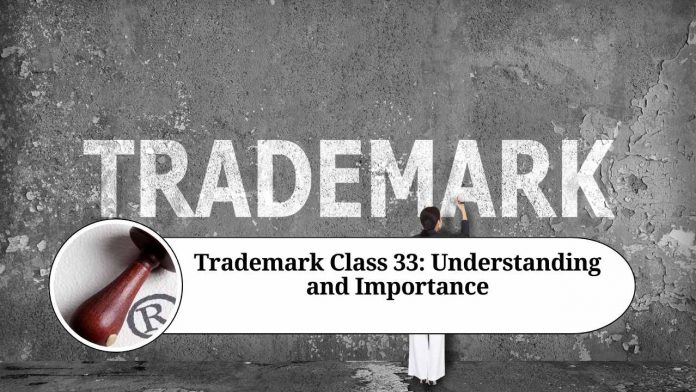Introduction
Trademark is a symbol or a sign which helps in identifying and distinguishing the products and services of one company from another. Trademark classifies these products and services into 45 classes which range from class 1 to class 45. Each class is related to a particular type of product or service. In this blog, we will discuss Trademark Class 33.
Trademark Class 33
Trademark Class 33 relates to alcoholic beverages except for beers. This class includes all kinds of alcoholic beverages such as whiskey, vodka, gin, rum, brandy, tequila, wine, champagne, cognac, and other alcoholic beverages which are not classified under beer. The class 33 goods are classified based on the alcoholic strength and the types of ingredients used in the preparation.
Goods included in Trademark Class 33
Trademark Class 33 includes the following goods:
- Alcoholic beverages except for beer
- Alcoholic cocktail mixes
- Alcoholic essences
- Alcoholic extracts
- Alcoholic bitters
- Alcoholic beverages containing fruit
- Alcoholic beverages containing honey
- Alcoholic fruit extracts
- Aniseed-flavored liqueurs
- Aperitifs
- Arrack
- Baijiu (Chinese distilled alcoholic beverage)
- Brandy
- Calvados
- Cocktails, pre-mixed
- Cider, alcoholic
- Cider-based beverages
- Curacao
- Digesters (liqueurs and spirits)
- Distilled beverages
- Distilled blue agave liquor
- Gin
- Grappa
- Hard cider
- Kirsch
- Liqueurs
- Mead (honey wine)
- Perry
- Pisco (Peruvian brandy)
- Rice alcohol
- Rice-based beverages
- Rum
- Sake
- Spirits (beverages)
- Tequila
- Vermouth
- Vodka
- Whisky
- Wine
- Alcoholic energy drinks
Goods not included in Trademark Class 33
Trademark Class 33 does not include the following goods:
- Non-alcoholic beverages
- Beers
- Non-alcoholic cocktail mixes
- Non-alcoholic fruit extracts
- Non-alcoholic fruit juice beverages
- Non-alcoholic fruit nectars
- Non-alcoholic fruit-based beverages
- Non-alcoholic honey-based beverages
- Non-alcoholic preparations for making beverages
- Syrups and other preparations for making beverages
Importance of Trademark Class 33
Trademark Class 33 is an essential classification for businesses involved in the production, distribution, and sale of alcoholic beverages. The classification ensures that companies can protect their brand identity, prevent infringement by competitors, and establish a unique identity in the market.
It is important to understand the products that fall under this class to determine whether your business needs to file a trademark application in this category. Filing under the incorrect class could result in rejection of the application or infringement by competitors.
Trademark Protection
Trademark protection in Class 33 provides businesses with exclusive rights to use a particular name or symbol for their products. This means that no other business can use the same trademark to market or sell similar products. As a result, businesses can establish a unique identity in the market and create brand awareness.
Trademarks also protect consumers from being misled by companies that use similar names or symbols to sell their products. Trademark registration ensures that businesses can distinguish their products from competitors and establish a reputation for quality and consistency.
Trademark Infringement
Trademark infringement occurs when a business uses a similar or identical trademark to market or sell its products. This can lead to confusion among consumers, and the original trademark owner may suffer financial losses as a result.
Trademark registration in Class 33 allows businesses to take legal action against infringers and seek compensation for any damages suffered as a result of infringement. The legal protection offered by trademarks in this category ensures that businesses can prevent their competitors from stealing their market share and profits.
Conclusion
Trademark Class 33 is an important classification for businesses involved in the production, distribution, and sale of alcoholic beverages. It is essential to understand the products that fall under this category and file a trademark application in the appropriate class to ensure legal protection and prevent infringement by competitors.
By registering a trademark in Class 33, businesses can establish a unique identity in the market, protect their brand reputation, and prevent their competitors from stealing their market share and profits. It is advisable to seek the assistance of a trademark attorney to ensure that the trademark registration process is conducted efficiently and effectively.
Read more useful content:
Frequently Asked Questions (FAQs)
What is Trademark Class 33?
Trademark Class 33 is a classification of the 45 trademark classes used to categorize products and services for trademark registration purposes. It covers alcoholic beverages except for beers.
What products fall under Trademark Class 33?
Trademark Class 33 includes all types of alcoholic beverages such as whiskey, vodka, gin, rum, brandy, tequila, wine, champagne, cognac, and other alcoholic beverages which are not classified under beer.
Do non-alcoholic beverages fall under Trademark Class 33?
No, non-alcoholic beverages do not fall under Trademark Class 33. They are classified under different trademark classes, such as Class 32 for non-alcoholic beverages.
Do beers fall under Trademark Class 33?
No, beers do not fall under Trademark Class 33. They are classified under Trademark Class 32.
What are the goods that are not included in Trademark Class 33?
The goods that are not included in Trademark Class 33 are non-alcoholic beverages, non-alcoholic cocktail mixes, non-alcoholic fruit extracts, non-alcoholic fruit juice beverages, non-alcoholic fruit nectars, non-alcoholic fruit-based beverages, non-alcoholic honey-based beverages, non-alcoholic preparations for making beverages, syrups, and other preparations for making beverages.
Why is it important to classify goods under the correct trademark class?
It is important to classify goods under the correct trademark class because it ensures that the application is not rejected by the trademark office. Moreover, it helps in preventing infringement by competitors and establishing a unique identity in the market.
How long does it take to register a trademark in Class 33?
The time required for trademark registration in Class 33 can vary depending on the jurisdiction and the specific requirements of the application. Generally, the process can take anywhere from 6 months to 2 years.
Can I file a trademark application for multiple classes?
Yes, you can file a trademark application for multiple classes. It is common for businesses to register their trademarks in multiple classes to protect their brand identity across various product categories.
What is the validity period of a trademark registration in Class 33?
The validity period of a trademark registration in Class 33 varies by jurisdiction. In most cases, it is valid for 10 years from the date of registration and can be renewed for additional 10-year periods.
Can I register a trademark for a specific region or country only?
Yes, it is possible to register a trademark for a specific region or country only. However, businesses that operate globally may want to consider registering their trademarks in multiple jurisdictions to ensure complete protection of their brand identity.




















